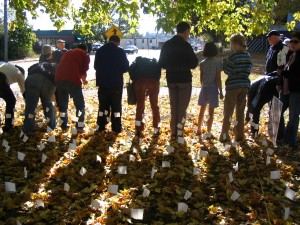Things I Did Not Know
 When I first began blogging, I did it every day. I considered it a writing exercise that combined both the business of staying in touch with that of political commentary. A month or so into that I found that I was writing every few days and then once a week. It takes time to find ones stride I guess, and I figured that once a week was not a hideous track record. Then I reached the three week mark in radiation and all of a sudden I discovered fatigue. This wasn’t the fatigue of sickness, the kind where you lie in bed and long for nothing more than Theraflu and swear by Emergen-C, and Samahan, all of which I have done and will, hopefully, resume doing soon. This is the kind of bone-deep weariness that made sitting outside wrapped in a blanket on a cool Maine-like-but-wait-this-is-Philly summer evening, and watching the fireflies come out, too much. This is the kind of tiredness where the world seemed to actually roll by before my eyes like a movie and where I could not muster the energy to open my eyes.
When I first began blogging, I did it every day. I considered it a writing exercise that combined both the business of staying in touch with that of political commentary. A month or so into that I found that I was writing every few days and then once a week. It takes time to find ones stride I guess, and I figured that once a week was not a hideous track record. Then I reached the three week mark in radiation and all of a sudden I discovered fatigue. This wasn’t the fatigue of sickness, the kind where you lie in bed and long for nothing more than Theraflu and swear by Emergen-C, and Samahan, all of which I have done and will, hopefully, resume doing soon. This is the kind of bone-deep weariness that made sitting outside wrapped in a blanket on a cool Maine-like-but-wait-this-is-Philly summer evening, and watching the fireflies come out, too much. This is the kind of tiredness where the world seemed to actually roll by before my eyes like a movie and where I could not muster the energy to open my eyes.
Alas, that meant that I had to put away my bus-tickets and convention pass and skip an event that I had been looking forward to: the South Asian Journalists’ Association convention in NY. I managed, briefly, to regain some enthusiasm upon hearing the voice of my friend and gracious host, Nora Maynard (check out her cocktails here where she writes for Apartment Therapy), enough that I could pick one outfit and eat some lunch and even make a call to a neighbor for a ride to the train station. But that was all I could manage. Instead I gave up the good fight and chalked the words that have bewildered a few visitors since as they stared at them on the flagstones behind the backdoor:
I am a bad girl who did not go to NY : (
Which is a long-winded way of saying that I have fallen short of the 7 day post rule and, also, that even though this kind of exhaustion was not familiar to me and I did not believe the doctors when they told me about it, I am trying to absorb what I can of the world around me, some of which I want to share today.
I usually listen to the conversation around me when I sit in the waiting room along with the other early-morning folk, all of whom now happen to be men. Sometimes they talk to me and I respond, about my bike ride, about a dropped ID card of mine that one of them had found, about the cookies on offer, about how much longer we each have and so forth. Together with them I listened to ongoing coverage of Michael Jackson’s death which overshadowed with such, albeit deserved, tumult, the death from cancer of Farah Fawcett. I listened to news about the suburban swimming pool which rescinded its permission (and returned their payment) to a Philly day camp when the non-“White” kids from the camp showed up to swim. And I listened as one of the men mused aloud to his friend that there had never been a welcome-home parade for the veterans of the Vietnam War.
I asked him about that when I came out after my session in the radiation room where I had also learned anew about the masks that people are able to put on when they are undergoing treatment after the removal of brain tumors. “We don’t want to tattoo someone’s face,” the technician told me, “so we put on this substance that conforms to their face and then hardens. We make the mark on that.” I could not get that picture out of mind – the sensation that a part of them was being left behind, lined up on a shelf that catches my eye each morning when I lie down. It made me wonder what of me I leave behind each morning for surely there is something that is lost or shed or forgotten?
I asked the man in the waiting room, an officer at the University of Pennsylvania, about what he had talked about earlier, with awkward words: “I didn’t know that,” I said tentatively, “about the Vietnam War, what you said, about never having had a welcome home parade.” So he explained it to me, this thing that was like a thorn in his side, the fact – as he explained it – that other veterans who have spent “a few months in Iraq” get a welcome, but not them. “They just call us baby killers.” I tried to talk to him about Tim O’Brien’s book, The Things They Carried, which is what I am reading in full again right now. He didn’t read books about the war, he told me, because he wanted to forget.
It has stayed on my mind. Surely the matter of forgetting the things one has been forced to do comes from the forgiving release of being recognized for having been forced to do them. Even I, a foreigner, an avid political activist, and someone who has written frequently about war, can see that there is a distinction between the soldier and the war. From a small town in Maine I watched as poor families sent their children off  to war for reasons that had little or nothing to do with believing in the “cause” of the previous administration. I protested the war but recognized the dead, joining the members of a local peace group, Waterville Bridges for Peace & Justice, in a controversial action to commemorate the dead in Iraq when the 2000th American soldier had been felled. And of all wars surely the Vietnam War was the worst where most of the young men who went were sent against their will and better judgment. Those young men are old men now. They sit, like my friend, in hospital waiting rooms or lie among the garbage on the streets of cities like Philadelphia. It is unutterably sad they were never permitted the release that civilians who have known no war can and should give them.
to war for reasons that had little or nothing to do with believing in the “cause” of the previous administration. I protested the war but recognized the dead, joining the members of a local peace group, Waterville Bridges for Peace & Justice, in a controversial action to commemorate the dead in Iraq when the 2000th American soldier had been felled. And of all wars surely the Vietnam War was the worst where most of the young men who went were sent against their will and better judgment. Those young men are old men now. They sit, like my friend, in hospital waiting rooms or lie among the garbage on the streets of cities like Philadelphia. It is unutterably sad they were never permitted the release that civilians who have known no war can and should give them.
I’ve started to read about this issue and just came across a statement by Michael Leon, a Vietnam veteran who saluted President Obama who, in word if not in deed, honored these veterans whom nobody else had seen fit to mention. I suppose that is a start.


Regarding the Vietnam War, the strongest perspective is from 10,000 Maniacs song, The Big Parade: “How would life have ever been the same if this wall had carved in it one less name?”
We just know the soldiers who died in the war. Behind one soldier is many more people who felt the impact of this loss. And, like you point out there are many more who returned alive, but a part of them had died.
Just an observation. I have seen people return from many wars since 1943. After every war, at least a little bit of everyone has died. After each war we’ve experienced, a little more dies. How manywars before there is nothing left to die?